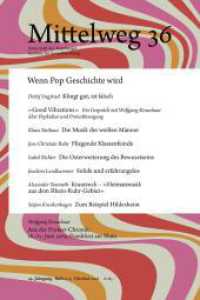- ホーム
- > 洋書
- > 英文書
- > Politics / International Relations
Full Description
America's empire expanded dramatically following the Spanish-American War of 1898. The United States quickly annexed the Philippines and Puerto Rico, seized control over Cuba and the Panama Canal Zone, and extended political and financial power throughout Latin America. This age of empire, Benjamin Allen Coates argues, was also an age of international law. Justifying America's empire with the language of law and civilization, international lawyers-serving simultaneously as academics, leaders of the legal profession, corporate attorneys, and high-ranking government officials-became central to the conceptualization, conduct, and rationalization of US foreign policy.
Just as international law shaped empire, so too did empire shape international law. Legalist Empire shows how the American Society of International Law was animated by the same notions of "civilization" that justified the expansion of empire overseas. Using the private papers and published writings of such figures as Elihu Root, John Bassett Moore, and James Brown Scott, Coates shows how the newly-created international law profession merged European influences with trends in American jurisprudence, while appealing to elite notions of order, reform, and American identity. By projecting an image of the United States as a unique force for law and civilization, legalists reconciled American exceptionalism, empire, and an international rule of law. Under their influence the nation became the world's leading advocate for the creation of an international court.
Although the legalist vision of world peace through voluntary adjudication foundered in the interwar period, international lawyers-through their ideas and their presence in halls of power-continue to infuse vital debates about America's global role
Contents
Acknowledgments
Introduction
Chapter 1: International Law in Europe and America to 1898
Chapter 2: Selling Empire, 1898-1904
Chapter 3: Legalism at Home: Professionalizing International Law, 1900-1913
Chapter 4: Legalism in the World, 1907-1913
Chapter 5: International Law and Empire in Latin America, 1904-1917
Chapter 6: Legalism, Neutrality, and the Great War, 1914-1918
Chapter 7: World War, Collective Security, and International Law, 1914-1941
Conclusion
Abbreviations Used in Notes
Notes
Bibliography
Index







